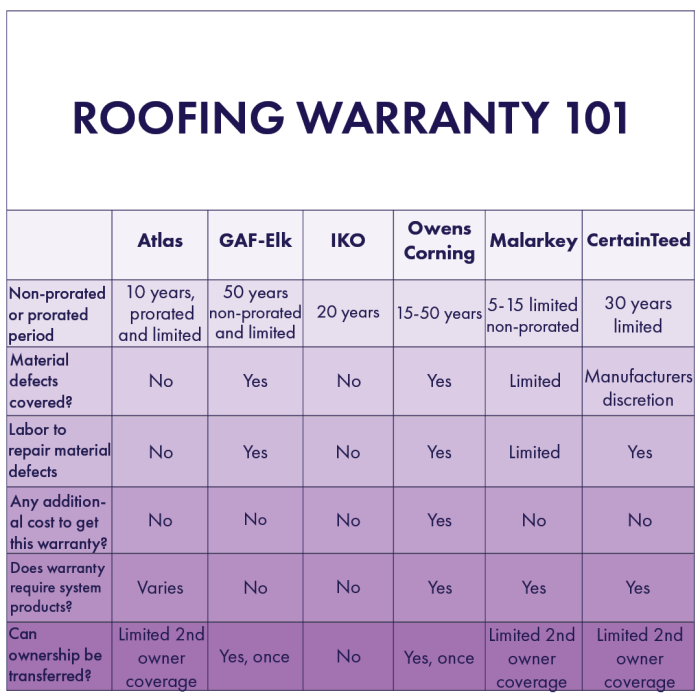Exploring Roofing Warranty Options for Homeowners

Delving into the realm of roofing warranty options, this article aims to shed light on the importance, types, and factors to consider when choosing the right warranty for your home.
As we navigate through the intricacies of roofing warranties, we aim to provide valuable insights and guidance for homeowners looking to protect their investment.
Table of Contents
ToggleImportance of Roofing Warranty Options
Roofing warranty options play a crucial role in providing homeowners with peace of mind and financial protection in case of unexpected issues with their roof.
Benefits of Having Different Warranty Options for Roofing
- Protection Against Defective Materials or Workmanship: Warranties can cover the cost of repairs or replacements if the roofing materials or installation are found to be faulty.
- Long-Term Investment Protection: Having a warranty in place can extend the lifespan of your roof and ensure that it continues to perform well over the years.
- Financial Security: In the event of a major roof repair or replacement, having warranty coverage can save homeowners from incurring significant out-of-pocket expenses.
Comparison of Risks Associated with No Warranty Coverage vs. Having Warranty Options
- No Warranty Coverage:
- Financial Burden: Without warranty protection, homeowners are responsible for covering the full cost of any repairs or replacements, which can be expensive.
- No Recourse for Defective Work: In the absence of a warranty, homeowners may have no legal recourse if the roofing materials or installation are subpar.
- Having Warranty Options:
- Peace of Mind: Knowing that your roof is covered by a warranty can provide peace of mind and assurance that you won't face unexpected financial burdens due to roof issues.
- Professional Repairs: With warranty options, homeowners can rely on professional roofers to address any problems, ensuring quality workmanship and materials.
Types of Roofing Warranty Options
When it comes to roofing warranty options, there are several common types available in the market. Understanding the differences between manufacturer warranties and contractor warranties, as well as the significance of transferable warranties for homeowners, is crucial for making informed decisions about protecting your investment in your roof.
Manufacturer Warranties
Manufacturer warranties are provided by the companies that produce the roofing materials. These warranties typically cover defects in the materials themselves, such as premature deterioration or failure. They may also include specific guarantees on the performance of the materials, such as protection against leaks or color fading.
Manufacturer warranties can vary in length and coverage, so it's important to carefully review the terms and conditions.
Contractor Warranties
Contractor warranties, on the other hand, are offered by the roofing installation company. These warranties cover the workmanship and installation of the roof, guaranteeing that the roof will be installed correctly according to industry standards. Contractor warranties may also include coverage for labor and repairs in case of any issues that arise due to installation errors.
It's important to choose a reputable contractor who offers a solid warranty to ensure the quality of the installation.
Transferable Warranties
Transferable warranties are warranties that can be transferred to a new homeowner if you decide to sell your property. This can be a valuable selling point for your home, as it provides reassurance to potential buyers that the roof is protected.
Transferable warranties can also increase the resale value of your home and make it more attractive to buyers. It's important to check the terms of the warranty to ensure that it can be transferred and understand any limitations that may apply.
Factors to Consider When Choosing Roofing Warranty Options

When selecting roofing warranty options, homeowners should take into account various key factors that can impact their decision. Factors such as roofing materials, climate, and installation play a crucial role in determining the most suitable warranty option for their specific needs.
Impact of Roofing Materials
Different roofing materials have varying durability and performance levels, which directly affect the type of warranty coverage needed. For example, asphalt shingles may have a shorter lifespan compared to metal roofs, leading to different warranty duration and coverage options.
Impact of Climate
Climate conditions in the area where the home is located can also influence the choice of roofing warranty. Harsh weather conditions such as extreme heat, heavy rain, or snow can impact the longevity of the roof, requiring more comprehensive warranty coverage to protect against potential damage.
Impact of Installation
The quality of the roof installation plays a significant role in the overall performance and lifespan of the roof. Improper installation can void the warranty or lead to issues not covered by the warranty. Homeowners should ensure that the roofing contractor is certified and experienced to avoid any installation-related warranty issues.
| Warranty Option | Duration | Coverage | Exclusions |
|---|---|---|---|
| Manufacturer's Warranty | 10-50 years | Defects in materials | Improper installation |
| Workmanship Warranty | 1-10 years | Installation errors | Normal wear and tear |
| Extended Warranty | Varies | Additional coverage | Specific exclusions Artikeld |
Understanding Warranty Terms and Conditions
When it comes to roofing warranties, it is crucial for homeowners to understand the terms and conditions laid out in the agreement. These details Artikel what is covered, what is excluded, and how the warranty claims process works. Here, we will break down the typical terms and conditions found in roofing warranties, list common exclusions that homeowners need to be aware of, and provide examples of how warranty claims processes function.
Typical Terms and Conditions in Roofing Warranties
- Duration of Warranty: Most roofing warranties specify the length of coverage, which can vary depending on the type of warranty.
- Covered Repairs: The warranty should clearly Artikel the types of repairs and damages that are covered, such as leaks or material defects.
- Maintenance Requirements: Some warranties require homeowners to perform regular maintenance to keep the warranty valid.
- Transferability: Check if the warranty can be transferred to a new homeowner if you decide to sell your home.
Common Exclusions in Roofing Warranty Agreements
- Acts of Nature: Damage caused by natural disasters like hurricanes, floods, or earthquakes may not be covered.
- Improper Installation: If the roof was not installed correctly, the warranty may be voided.
- Lack of Maintenance: Failing to maintain the roof as per the manufacturer's guidelines can lead to warranty exclusions.
- Unauthorized Repairs: Making repairs with unauthorized contractors or materials can void the warranty.
Warranty Claims Process and Preparation
- Contacting the Manufacturer: Start by reaching out to the manufacturer or warranty provider to initiate the claims process.
- Evidence Collection: Prepare documentation such as photos, receipts, and inspection reports to support your claim.
- Inspection: The warranty provider may send an inspector to assess the damage and determine if it is covered under the warranty.
- Resolution: Once the claim is approved, the warranty provider will Artikel the repairs or replacements that will be covered.
Last Point
In conclusion, understanding roofing warranty options is essential for homeowners to safeguard their roofs and ensure peace of mind. By weighing the benefits, types, and considerations, you can make an informed decision that suits your needs.
Answers to Common Questions
What are the benefits of having different warranty options for roofing?
Having various warranty options provides homeowners with protection against unforeseen damages and ensures peace of mind knowing that their investment is secure.
What factors should homeowners consider when choosing roofing warranty options?
Key factors to consider include the duration of coverage, types of exclusions, transferability, and the impact of roofing materials and climate on the warranty.
How do warranty claims processes work for roofing warranties?
Warranty claims typically involve homeowners contacting the warranty provider, documenting the issue, and following the prescribed steps to get the necessary repairs or replacements.
Related posts
Exploring Global Siding and Roofing: A Comprehensive Guide
Choosing the Best Residential Painting Company: A Comprehensive Guide
Finding the Best Residential Painting Company Near Me
Exploring the Benefits of Metal Siding for Houses
Recent Posts
- Maximizing Efficiency: Real Estate Property Management
 by Raimu Su Exterior Fiding
by Raimu Su Exterior Fiding - Exploring Affordable Home Siding Options
 by Raimu Su Exterior Fiding
by Raimu Su Exterior Fiding - Exploring Boutique Property Management Companies: A Comprehensive Guide
 by Raimu Su Exterior Fiding
by Raimu Su Exterior Fiding

